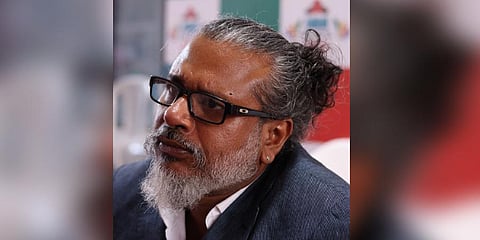

THIRUVANANTHAPURAM: Absurdity, humour and satire help Sri Lankans overcome times of distress and it was only natural that such elements got reflected in his Booker Prize-winning novel ‘The Seven Moons of Maali Almeida’, Sri Lankan author Shehan Karunatilaka said.
In an interaction on the sidelines of the Kerala Legislature International Book Festival here on Wednesday, Shehan said even though Sri Lanka has gone through a lot of turmoil over the past three decades, it is not an “entirely grim place”. Even during the recent economic crisis in the island nation, when one had to wait for days to get fuel and basic supplies, the humour was not entirely missing from the people, he added.
“Maybe this is our coping mechanism. Either we laugh at each other or kill each other. So it is better to laugh and make jokes than resort to violence,” Karunatilaka said. He added that the humour and trolls that one sees in Sri Lanka in the present times would not have existed a decade ago.
“In the recent grim times, there were jokes and political cartoons mocking our leaders and making fun of them,” he said. Shehan said the humour and satire in his work were not something that was “contrived” and added that there was plenty of absurdity all around to draw inspiration from.
Even though he did not reveal much about his upcoming work, Karunatilaka said it would be essentially about ‘Sri Lanka’ and ‘absurdity’. “There won’t be any cricket or dead bodies or ghosts in it,” he quipped.
Karunatilaka said the late Sri Lankan writer Carl Muller’s works has had a great influence on most of his writings. He admitted to watching horror movies and reading ghost stories before beginning his award-winning novel.
“I had to envision what the afterlife was like. But soon I concluded that the afterlife is a bureaucracy. We have an illusion that all answers will be revealed when one dies. But that’s not true,” he said.
On using the second person narrative in his novel, Karunatilaka said it suited his work as the voice in a person’s head after death is essentially in the second person. “You don’t get too many second-person narratives. I used the technique and pages started flowing,” he said.
Karunatilaka did not entirely agree with the interpretation of a few readers that the protagonist Almeida was a person with a leftist ideology. “He may have been sympathetic to the Left and even the Tamil movement, but he also saw their flaws. He can be called a nihilist to be more precise,” the author said.
On legendary Sri Lankan spinner Muttiah Muralitharan’s biopic ‘800’ for which he was the co-writer, Karunatilaka said as a Tamil, the cricketer was a very “divisive figure”. The author said Tamils have complained that Muralitharan has never spoken up for them. His association with leaders of the “regime” also earned him a lot of criticism.
“Was he a great bowler or what he a fraud? Was he the person who unified this divided nation or was he a traitor to his race?,” Karunatilaka asked and added that such facets in the cricketer evoked his interest.